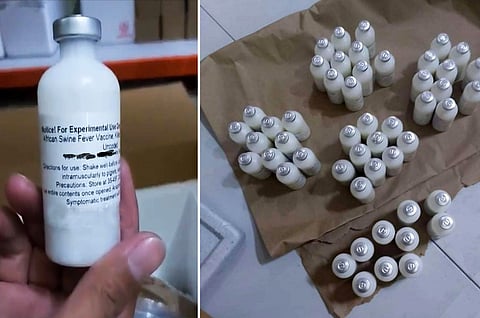
- NEWS
- the EDIT
- COMMENTARY
- BUSINESS
- LIFE
- SHOW
- ACTION
- GLOBAL GOALS
- SNAPS
- DYARYO TIRADA
- MORE

The Bureau of Animal Industry (BAI) on Tuesday reported that results of the controlled vaccination of hogs against African swine fever (ASF) in Lobo, Batangas, showed that some pigs died post-vaccination while the majority “remained in good health.”
“PCR tests on the deceased pigs confirmed ASF infection. Since the live attenuated vaccine can also be detected by PCR, additional diagnostic tests are underway,” the BAI said in a statement.
According to Assistant Secretary for Swine and Poultry Dr. Constante Palabrica, the enzyme-linked immunosorbent assay (ELISA) test results are available, which measures the immune response by detecting antibody levels. An increase in percentage blocking shows stronger immunity, he said.
“The ELISA test results showed the presence of antibodies against ASF in some pigs, indicating they were building immunity,” Palabrica said, noting that all remaining pigs were “healthy and under close observation.”
He added that differentiating infected from vaccinated animal (DIVA) tests are “in progress.”
“The DIVA test distinguishes between vaccinated pigs and those infected with the field virus, which will help determine if the virus in the deceased pigs is linked to the vaccine or external sources,” Palabrica explained.
Agriculture Secretary Francisco Tiu Laurel Jr., meanwhile, said the initial results are part of the government’s efforts to protect the hog industry.
“We remain hopeful, but cooperation from all stakeholders is vital. Strict adherence to vaccination protocols and biosecurity measures is crucial,” the agri chief said.
The 30-day post-vaccination period is critical for assessing vaccine effectiveness and ensuring the health of the remaining pigs, said the BAI.
ASF-controlled vaccination commenced last August in Lobo, which is ground zero for the largest ASF outbreak since the monsoon season began.
